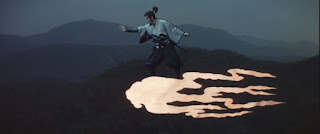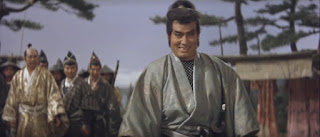I am by no means sour on Antoine Fuqua’s The Magnificent Seven (2016) remake, and those that are have no real leg to stand on – unless they’re bitching about another pointless remake of Seven Samurai (1954).
However, I did feel there was something sorely missing from the trailer. Not something your eyes missed, but your ears. What I’m saying is, gets some Elmer Bernstein or GTFO.
Video courtesy of HD Film Tributes.
Can we all agree that Bernstein’s score is the one definitive thing where Sturges' film ran circles around Kurosawa? Even if you just can’t do that, you cannot deny how awesome and transcendent that music is. And the scary part, it almost wasn’t and was almost something completely different.
Apparently, Dimitri Tiomkin was set to score the film but was fired when he and Sturges disagreed vehemently over the music for the opening credits. Seems Tiomkin wanted another ballad like he did with Frankie Lane for Gunfight at the O.K. Corral (1957), perhaps like the one used for the trailer. (Or perhaps that was Tiomkin’s initial piece that was later rejected?) Go ahead, give that a listen, and now imagine that over the opening credits instead of that driving, horn heavy, buzz-sawing strings laden, and bombastic piece of awesome instead. Thus, Tiomkin, whose music I otherwise love, was dismissed and replaced with Bernstein. And Tiomkin’s loss was definitely our gain.
I’ve been listening to The Magnificent Seven soundtrack on Spotify a lot lately, all of it, and am constantly mesmerized by how well it all stitches together, with the main theme echoing through all of it. This score doesn’t just fly, it soars. Sure, that main theme was used and abused most horribly in the subsequent sequels, so much so that it almost became something akin to circus music – a clown car ditty that made your eyes roll. But it’s been almost fifty years since The Magnificent Seven Ride (1972) and nearly twenty since last used in the TV series spin-off, and I think it’s high time to take it out, polish it off, and give it another cinematic spin.
And one last note before I go: if you enjoyed that music video, be sure to check out HD Film Tributes YouTube channel because he’s got a whole lot more soundtrack vids edited together and they’re all just as great as that one.
The Magnificent Seven (1960) Mirisch Company :: Alpha Productions :: United Artists / EP: Walter Mirisch / P: John Sturges / AP: Lou Morheim / D: John Sturges / W: William Roberts / C: Charles Lang Jr. / E: Charles Lang Jr. / M: Elmer Bernstein / S: Yul Brynner, Steve McQueen, Charles Bronson, Robert Vaughn, James Coburn, Brad Dexter, Horst Bucholz, Eli Wallach























































